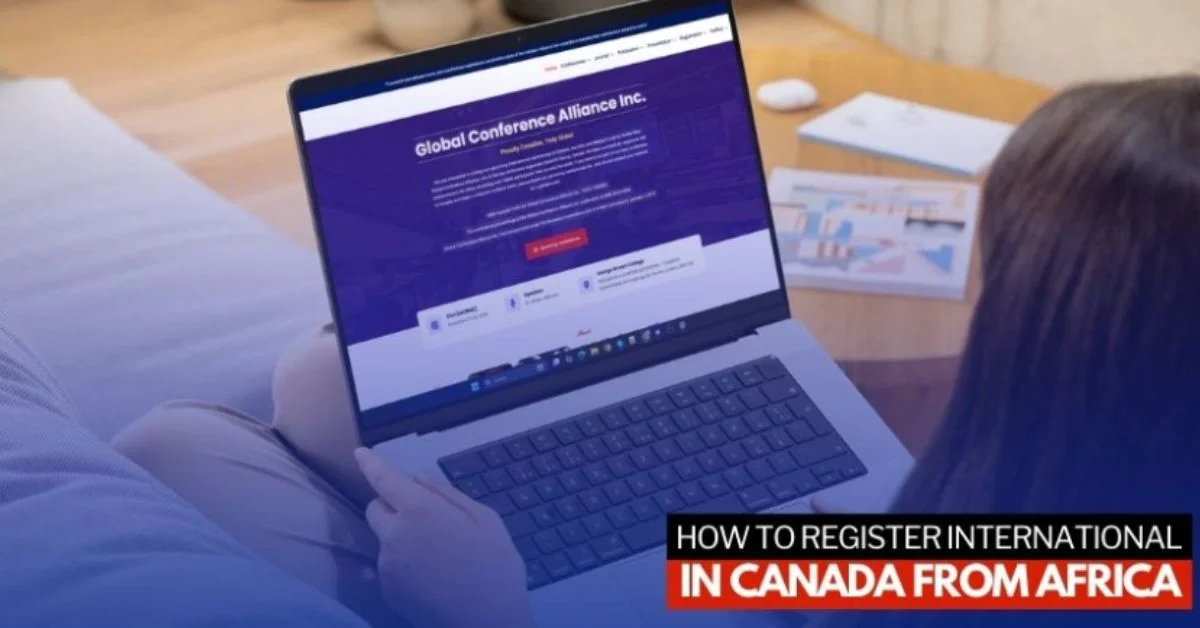Conference participation in Canada offers an excellent opportunity for international professionals, academics, and researchers to network, share insights, and expand their knowledge. With a vibrant mix of industries and academic fields, Canada hosts a variety of prestigious conferences throughout the year. But the question is: How to register for international conferences in Canada?
To register for international conferences in Canada, first choose a relevant conference, review its application requirements, and prepare any necessary documents. Complete the registration form, pay applicable fees, and request an invitation letter. Secure travel arrangements early. Planning ahead for travel and accommodations is key.
Follow along as we guide you through each step to make your conference registration smooth and hassle-free!
What Does an International Conference in Canada Entail?
Attending an international conference in Canada offers many exciting learning and networking opportunities. You can meet experts and professionals from different fields who share similar interests and goals. Each conference often includes workshops, seminars, and panel discussions designed to promote professional growth.
Attending these conferences offers an excellent opportunity to exchange ideas and build global connections. By participating in conferences in Canada, you gain valuable insights into the latest industry trends and advancements. Presenters and speakers share in-depth information about innovations and recent research in their fields.
You will also have the chance to showcase your work, receive feedback, and develop your expertise. This experience can strengthen your skills and deepen your knowledge of current topics. Aside from the sessions, international conferences usually have networking events and informal gatherings.
How to Register International Conferences in Canada?
International conferences offer exciting networking opportunities, opportunities to learn, and opportunities to grow professionally. Whether you’re an academic, a researcher, or a professional, registering for these events requires careful planning. Follow these step-by-step instructions to ensure a smooth registration process and make the most of your experience.
Step 1: Identify the Right Conference
Choosing a relevant conference is the first essential step toward a successful experience. Look for conferences that align with your professional interests by exploring websites, professional organizations, and academic journals. Identifying a suitable event helps you connect with like-minded people and maximize learning. Make sure the conference’s themes and topics align with your goals.
Step 2: Check Application Requirements
Each conference may have its application requirements, so review these details closely. Check the conference website to determine if you need an abstract, proposal, or additional documents like a CV. Knowing the requirements ahead of time gives you a head start on preparing your materials. Adhering to all guidelines enhances your chances of successful registration.
Step 3: Prepare Your Submission
Writing a compelling submission is essential if you’re required to submit an abstract or proposal. Clearly highlight your expertise or research to engage the conference selection panel. Following the conference’s submission guidelines and meeting deadlines will also work in your favor. Strong, timely submissions often stand out among applicants.
Step 4: Submit Your Application and Pay Fees
Completing the online registration form accurately is crucial, as it often includes personal and professional details. Double-check all information before submitting your application, as errors can cause delays. Be sure to pay the registration fee, if required, to secure your spot. Retain a record of payment for future reference.
Step 5: Request an Invitation Letter
Some conferences provide invitation letters, which may be essential for your Canadian visa application. If you need this document, reach out to the conference organizers well ahead of time. Having an official event invitation letter confirms your participation and supports your visa application process. This step is especially important for international attendees.
Step 6: Apply for a Visa or eTA
Determine if you need a visa or an Electronic Travel Authorization (eTA) to enter Canada. Apply for the necessary travel documents as early as possible, as processing times can vary. Visit the Canadian immigration website to check requirements specific to your country. A timely application avoids last-minute travel complications.
Step 7: Book Travel and Accommodation
Securing your travel and lodging arrangements early can save you money and ease your planning. Some conferences offer discounted rates at partner hotels, so it’s worth checking the conference website. Booking flights and accommodations in advance ensures you find the best options at reasonable rates. Travel planning adds comfort to your conference experience.
Step 8: Prepare for Conference Participation
Planning your conference activities in advance can help you maximize your experience. Review the schedule and note sessions, panels, and networking events you want to attend. Bringing business cards and presentation materials also enriches your professional interactions. Preparation ensures you gain the most from each session and connection.
Step 9: Follow Up After the Conference
Building professional relationships doesn’t end at the conference, so following up with new contacts is essential. Sending a thank-you email or connecting on LinkedIn shows appreciation and solidifies connections. These small gestures can lead to valuable collaborations or career opportunities in the future. Staying connected builds a supportive, global professional network.
What Happens After You Complete Your Conference Registration?
After completing your conference registration, there are a few important steps to help you make the most of your experience. Preparing well can help maximize your time at the conference and ensure everything goes smoothly. Here’s what typically happens next and what you should focus on:
- Review the conference schedule to plan your sessions and networking events in advance. Knowing the schedule helps you prioritize activities relevant to your goals.
- Begin preparing any presentation materials, if applicable, to ensure you’re ready to present confidently. Practising beforehand can boost your comfort level and impact.
- Arrange travel documents, such as a visa or passport, well before the conference date. Keeping your documents updated minimizes travel-related stress.
- Book flights and accommodations if you haven’t already secured them to avoid last-minute hassles. Consider nearby options for easier access to the conference venue.
- Pack essentials like business cards, a notebook, and extra copies of any presentation files. These small items help you network and stay organized.
- Familiarize yourself with the conference location, including nearby transportation, restaurants, and amenities. Knowing the area makes your stay more comfortable and enjoyable.
- Connect with other attendees on professional networking platforms to establish connections before the event. This advanced networking can make introductions easier once you’re there.
Tips to Help You Find a Suitable Conference in Canada?
Finding the right conference in Canada can contribute to your professional growth, expand your network, and deepen your expertise. But with numerous options, choosing a suitable conference can feel overwhelming. These tips will guide you in selecting a conference that aligns with your goals and interests.

Define Your Professional Goals
Clarifying your goals will help you pinpoint conferences that genuinely match your career or research ambitions. Consider what you hope to gain, whether it’s knowledge, networking, or presenting opportunities. Knowing your objectives helps narrow down the events that align best. When you’re focused on your goals, selecting a conference becomes much easier.
Explore Reliable Conference Websites
Conference-specific websites and databases offer extensive information on upcoming events in Canada, categorized by industry and location. These platforms let you filter by theme, date, or region, simplifying your search. Reliable sites also provide conference reviews to help you evaluate their value. Using these resources saves time and connects you to relevant conferences.
Check Professional Associations
Professional organizations and associations often sponsor conferences relevant to specific fields, which can be incredibly beneficial. Many associations list upcoming events on their websites or in newsletters for easy reference. These events are usually highly relevant and attract field-specific attendees. Relying on professional associations boosts your chances of finding high-quality, industry-related conferences.
Look into Academic Journals
Many academic journals feature upcoming conferences related to their published research fields, making them a valuable source. Journals often highlight significant conferences where groundbreaking research is shared and discussed. This approach is particularly helpful for researchers and academics looking for research-centered events. Checking journals keeps you informed about impactful, knowledge-driven conferences.
Network with Colleagues and Mentors
Reaching out to colleagues or mentors can offer useful recommendations for conferences that suit your interests and needs. Professionals in your field may know of lesser-known events or specialized gatherings. Asking for their insights often reveals interesting opportunities beyond popular lists. Networking provides a trusted way to discover meaningful, relevant events.
Bottom Lines
Attending an international conference in Canada offers incredible opportunities for professional growth, learning, and networking. With proper preparation, from choosing the right conference to arranging travel and following up afterwards, you can make the most of these events.
Knowing how to register international conferences in Canada ensures a smooth experience, allowing you to focus on the knowledge and connections gained. Whether it’s finding the perfect event, completing the registration process, or planning your participation, these steps will help you make the most of your conference journey and open up new doors for your career.
For more information click here.









